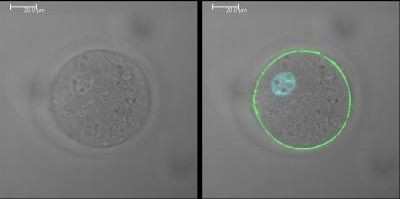New Fertility Protein Discovered, 'Juno' Molecule Is ‘Essential’ For Sperm And Egg Binding

A new molecule has been discovered that has unlocked a fundamental key to fertility.
Named Juno after the Roman goddess of fertility, the molecule allows for the sperm and egg to recognize each other. Scientists created an artificial version of a known binding protein found on sperm to identify its counterpart on an egg.
"We have solved a long-standing mystery in biology by identifying the molecules displayed on all sperm and egg that must bind each other at the moment we were conceived," Dr. Gavin Wright, senior author from the Sanger Institute said in a statement. "Without this essential interaction, fertilization just cannot happen. We may be able to use this discovery to improve fertility treatments and develop new contraceptives."
The discovery is the second part to a search that started in 2005 when scientists discovered the binding protein on sperm named Izumo. Since then scientists have been searching for its receptor on the egg. To do so they created an artificial version of the Izumo protein and discovered that it interacted with the Juno protein on the egg. The team then developed mice that lacked the Juno protein. The mice were infertile since they were incapable of fusing with normal sperm which proved that the Juno protein was essential for the fertilization process.
"The Izumo-Juno pairing is the first known essential interaction for sperm-egg recognition in any organism," Dr. Enrica Bianchi, study co-author, told the Guardian. "The binding of the two proteins is very weak, which probably explains why this has remained a mystery until now."
Once the sperm and egg bind, the Juno molecule becomes undetectable after 40 minutes. This may explain why future sperm cells are shut down once the egg become fertilized.
Juno wasn’t a completely new discovery. The protein was originally known as Folr4 and was believed to be part of the folate-receptor family. Its purpose was largely misunderstood. The latest study was the first to isolate the protein as an integral component for sperm to bind with eggs.
The discovery may lead to fertility testing for this particular protein, Dr. Allan Pacey, senior lecturer in reproduction and developmental medicine at the University of Sheffield, said. While this may not necessarily be a major cause of infertility it may contribute to a broader understanding of fertility issues.
"The second, and perhaps most likely application, is whether scientists could devise drugs or vaccines that could block the way this protein works or how the sperm protein Izumo1 interacts with it. This could lead to a new and novel non-hormonal contraceptive for both humans and other species of mammals," he added.
© Copyright IBTimes 2024. All rights reserved.






















